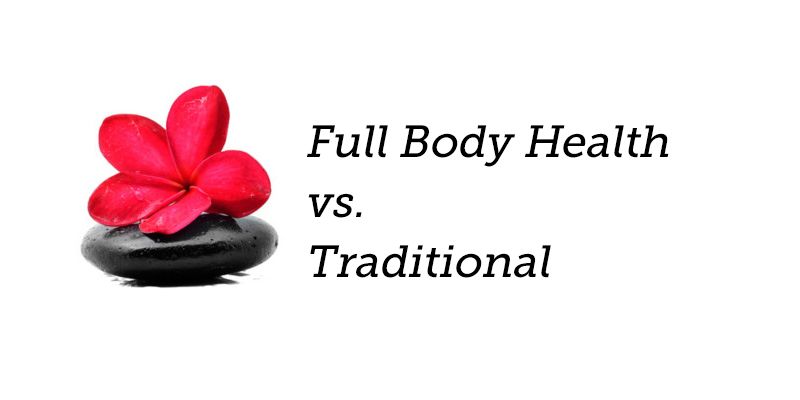People often ask questions like: “what’s the difference between a full body health dentist and a traditional dentist?” or “how similar is a full body health dentist to a traditional dentist?”
All dentists receive the same basic education and training in dental school, that is, the same theory and the same methods of practice to become what is commonly known as a ‘general’ dentist. Some of these general dentists may have further developed, through continuing education courses and training, a subspecialty like: family dentist, cosmetic dentist or full body health dentist.
A full body health dentist offers conventional and complementary dental care. Unlike a traditional dentist, who may focus on one particular tooth or gum problem, the full body health dentist focuses on an individual’s whole body health. By identifying underlying imbalances in the body, a full body health dentist safely and effectively treats the problem with a combination of natural remedies and modern dental treatment. The full body health dentist is keenly aware of the best, most comprehensive long-term treatments necessary for restoring a patient’s oral and, ultimately, total health.
Like that of a traditional dentist, a full body health dentist’s approach to care can vary from practice to practice. Following are a few differences between a full body health dentist and a traditional dentist:
The full body health dentist refrains from using materials that many people feel are inferior. Materials such as silver mercury (amalgam) fillings may, according to the IAOMT, lead to a metallic taste, mouth ulcers, gum or other problems in some people. Rather, the full body health dentist only uses what he/ she believes are safer, more biocompatible materials. The full body health dentist may consent to a patient’s desire to have older, deficient fillings removed, especially if they exhibit an established sensitivity to that material. If so, they would do so with a safe, controlled procedure that minimizes the patient’s exposure to potentially harmful by-products.
The full body health dentist typically uses only digital x-ray systems thereby reducing emitted radiation by, in some cases, as much as 80% over traditional x-ray systems.
The full body health dentist approaches the need for root canal therapy with increased scrutiny and investigation. Root canal therapy is seen, in many cases, as a comforting yet transitional mode of treatment. The full body health dentist is aware that a tooth treated with root canal therapy may exist in a weakened state and, in cases where the root canal therapy on a tooth is failing, may expose the patient to recurrent, yet localized infections.
The full body health dentist is sensitive to some patients’ concerns over certain in-office anti-cavity treatments and, then, may suggest a more natural alternative or herbal remedy.
All Ontario dentists, regardless of their practice orientation, are required to separate waste amalgam (as a source of mercury) from their municipality’s wastewater. Beyond that, the full body health dentist is very environmentally conscious and responsible. The full body health dentist creates an office environment that is safe, biocompatible and minimally invasive to prevent potentially harmful effects on patients and dental personnel alike.
When choosing between dentists, whether full body health or traditional, it is very important to select one whose philosophy on health complements yours.

